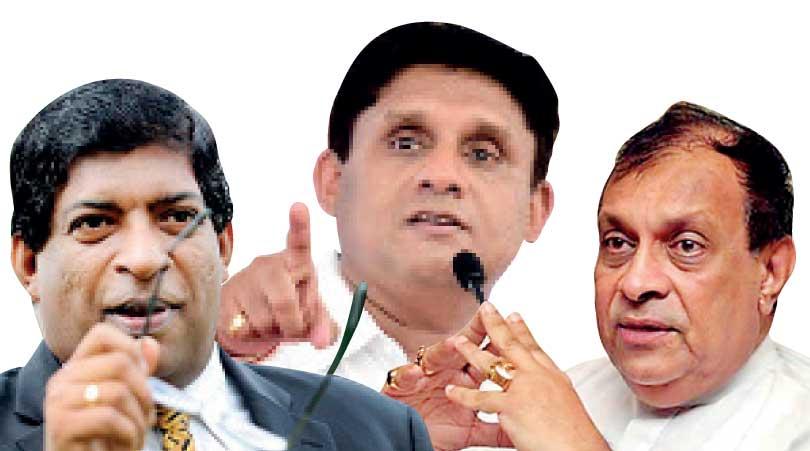20 Jun 2019 - {{hitsCtrl.values.hits}}

 As the presidential election period approaches day by day, the mainstream political parties are fully occupied with their internal discussions, manipulations and manoeuvrings on the selection of their candidates to be fielded.
As the presidential election period approaches day by day, the mainstream political parties are fully occupied with their internal discussions, manipulations and manoeuvrings on the selection of their candidates to be fielded.
At this election, as has always been, there will be two main contestants. In addition, a number of other candidates will vie to play different political roles, both overtly and covertly, in the run up to polling day. Of the two main contestants, one will represent the political force led by the United National Party (UNP) and the other, the movement spearheaded by the Sri Lanka Podujana Peramuna (SLPP).
The internal struggle of the UNP in selecting a candidate is more critical than last time, and in fact, has become a three-pronged tussle led by different factions of the party.
On the last two occasions, the UNP supported the concept of a common candidate. The party unsuccessfully supported former Army Commander Sarath Fonseka as the chosen common candidate in 2010, but the same strategy applied in 2015 worked well. The party – backed by likeminded parties and groups – supported President Maithripala Sirisena as the common candidate in 2015. His election to presidency ended the ten-year rule of Mahinda Rajapaksa. The UNP had a well-orchestrated political plan to be elected afterwards, but it did not materialise owing to differences with President Sirisena that emerged during the course of time. The two sides have now fallen out with each other. With President Sirisena at the helm of affairs, it was a bitter experience to the UNP.
Given that painful encounter, it is impossible for the UNP to galvanise its rank and file to select someone from outside the party as a common candidate for nomination this time around. The rank and file, backed by a considerable number of MPs, has firmed up its position that the party should field its own presidential candidate this time no matter what.
Mr. Premadasa remains noncommittal about his bid though his loyalists such as Non-Cabinet Minister Ajith P. Perera and MP Dilip Wedaarachchi openly promote him
In the selection of a candidate, the party is determined to bank their fortunes on the best bet. But three schools of thought prevail within the party on the most suitable candidate. A significant section of the party advocates candidacy for Housing and Construction Minister Sajith Premadasa who is also the UNP deputy leader. Another section backs Speaker Karu Jayasuriya.
Power and Energy Minister Ravi Karunanayake who harbours personal animosity towards Mr. Premadasa looks determined to block candidacy for Mr. Premadasa. So he along with several others is supportive of the bid made by the Speaker for his nomination.
There is another section that stands by Prime Minister Ranil Wickremesinghe to clinch candidacy.
The differences within the UNP over candidacy emerged once again at the party’s parliamentary group meeting on Monday evening.
 Mr. Wickremesinghe had reportedly requested the MPs to reach out to their constituents and engage them ahead of the elections. He said the government had carried out sufficient development work at a village level and that it could be capitalised for electoral gains.
Mr. Wickremesinghe had reportedly requested the MPs to reach out to their constituents and engage them ahead of the elections. He said the government had carried out sufficient development work at a village level and that it could be capitalised for electoral gains.
However, Puttalam District MP Palitha Range Bandara, who is now in charge of the trade union wing of the party, was not receptive to the idea. He said constituents constantly inquired about the presidential candidate. Therefore, he asked the party leadership to convene the Working Committee to discuss it.
The deadly battle that rages among factions within the UNP on the selection of a presidential candidate is more intense this year. Unlike in the past, the aspirants are openly bidding for it.
The Speaker has spelled out his interest in clear-cut terms during his interaction with the local and international media. He has undertaken his lobbying spree by visiting the Buddhist clergy and engaging them. The Buddhist clergy is traditionally influential in shaping public opinion.
For whatever reason, Mr. Premadasa remains noncommittal about his bid though his loyalists such as Non-Cabinet Minister Ajith P. Perera and MP Dilip Wedaarachchi openly promote him. Nonetheless, Mr. Premadasa conducts himself in a manner that is well-indicative of his future leadership ambition.
Policy-wise, he is driven by a populist agenda. On some occasions, he deviated from the official line of the party to cater to the popular or populist approach. He was openly critical of the Counter-Terrorism Bill despite the Prime Minister being serious about getting it passed in Parliament. He showered praise on President Sirisena on the declaration of Tripitaka as a national heritage and his war on drugs. He is in good terms with the President whereas his party is not.
According to the law, nominations have to be called for the presidential election after October 20, 2019. The parties have to soon be ready with their candidates. In the selection of its candidate, the UNP will take stock of things and cash in on someone with the potential to win the Tamil and Muslim votes in the North and the East en bloc, if possible. `
Two Muslim MPs – Kabir Hashim and Abdul Haleem - who relinquished their ministerial offices rejoined the Cabinet yesterday. Especially, Mr. Hashim’s rejoining is seen as a shot in the arms for Mr. Premadasa in his lobbying for presidential candidacy.
Mr. Hashim is now viewed as someone who is supportive of candidacy for Mr. Premadasa. Before he rejoined the Cabinet, Mr. Premadasa made a request to him to accept portfolios. He in fact issued a statement to the media in this respect. Accordingly, things fall in perspective for anyone to understand the bonhomie between the two.
The Muslim MPs resigned en masse from their ministerial posts following allegations levelled against them on Easter Sunday terrorist attacks. Among the lot, it was only MP Rishad Bathiudeen who was facing allegations. Many wondered why all the MPs resigned. It was widely thought their resignations were an act of solidarity with Mr. Bathiudeen facing charges.
Upon resignation, Mr. Bathiudeen would have become a hero in the eyes of his people. Then, he could have made inroads into the traditional Muslim vote base of the Sri Lanka Muslim Congress (SLMC) led by MP Rauff Hakeem and emerged as the most prominent Muslim politician. The SLMC took this calculation seriously and its MPs too quit the government to re-balance the political equation which was otherwise bound to be favourable to Mr. Bathiudeen and his All Ceylon Makkal Congress (ACMC).
Such calculation laid the groundwork for all Muslim MPs to leave en masse. It was a politically beneficial move for the MPs predominantly elected with Muslim votes. But, for Mr. Hashim and Mr. Haleem of the UNP, things did not work the same way. Majority of their constituents are Sinhalese. So they came under pressure from their people to rejoin the Cabinet.
All these MPs held a meeting on Tuesday to decide whether they should accept portfolios or not. They concluded after much deliberation that they would accept posts upon request from their respective party leaders.
Mr. Bathiudeen said he would not accept any post until he was cleared of his allegations. He said he would wait till the next presidential election to take a political decision.
Also, Mr. Hakeem is unlikely to join the Cabinet. One can anticipate him as being part of the Cabinet and once again the groundwork is laid for his return in terms of solutions to the grievances of the Muslims.
Minister Karunanayake who harbours personal animosity towards Mr. Premadasa looks determined to block candidacy for Mr. Premadasa
Following the Easter Sunday terrorist attacks that killed more than 250 persons, a lot of diversion had taken place. The terror strike brought to focus the need to quell violent religious extremism. It is true that the terrorist apparatus of National Tawheed Jamaath (NTJ) led by Zahran Hashim, who masterminded the serial bombings on April 21, has been dismantled. Yet, there is always the danger of a next wave of terrorism emerging as there are radicalised elements.
However, the subsequent violence on Muslim-owned shops and dramatic political developments diverted the attention from the main topic, and today, some behave as if nothing happened on April 21.
It is more important to pay attention to the core issue.
20 Apr 2024 26 minute ago
20 Apr 2024 38 minute ago
20 Apr 2024 58 minute ago
20 Apr 2024 2 hours ago
20 Apr 2024 2 hours ago